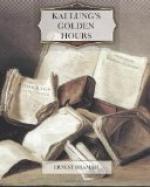“That is beyond the province of the saying,” replied Ming-shu. “Nor is it known to my remembrance.”
“Then out of your own mouth a fitting test is set, which if Kai Lung can agreeably perform will at once demonstrate a secret and a guilty confederacy between you both. Proceed, O story-teller, to incriminate Ming-shu together with yourself!”
“I proceed, High Excellence, but chiefly to the glorification of your all-discerning mind,” replied Kai Lung.
The
Story of Yuen Yan, of the Barber Chou-hu,
and
His Wife Tsae-che
“Do not despair; even Yuen Yan once cast a missile at the Tablets,” is a proverb of encouragement well worn throughout the Empire; but although it is daily on the lips of some it is doubtful if a single person could give an intelligent account of the Yuen Yan in question beyond repeating the outside facts that he was of a humane and consistent disposition and during the greater part of his life possessed every desirable attribute of wealth, family and virtuous esteem. If more closely questioned with reference to the specific incident alluded to, these persons would not hesitate to assert that the proverb was not to be understood in so superficial a sense, protesting, with much indignation, that Yuen Yan was of too courteous and lofty a nature to be guilty of so unseemly an action, and contemptuously inquiring what possible reason one who enjoyed every advantage in this world and every prospect of an unruffled felicity in The Beyond could have for behaving in so outrageous a manner. This explanation by no means satisfied the one who now narrates, and after much research he has brought to light the forgotten story of Yuen Yan’s early life, which may be thus related.
At the period with which this part of the narrative is concerned, Yuen Yan dwelt with his mother in one of the least attractive of the arches beneath the city wall. As a youth it had been his intention to take an exceptionally high place in the public examinations, and, rising at once to a position of responsible authority, to mark himself out for continual promotion by the exercise of unfailing discretion and indomitable zeal. Having saved his country in a moment of acute national danger, he contemplated accepting a title of unique distinction and retiring to his native province, where he would build an adequate palace which he had already planned out down to the most trivial detail. There he purposed spending the remainder of his life, receiving frequent tokens of regard from the hand of the gratified Emperor, marrying an accomplished and refined wife who would doubtless be one of the princesses of the Imperial House, and conscientiously regarding The Virtues throughout. The transition from this sumptuously contrived residence to a damp arch in the city wall, and from the high destiny indicated to the occupation of leading from place to place a company of sightless mendicants,




